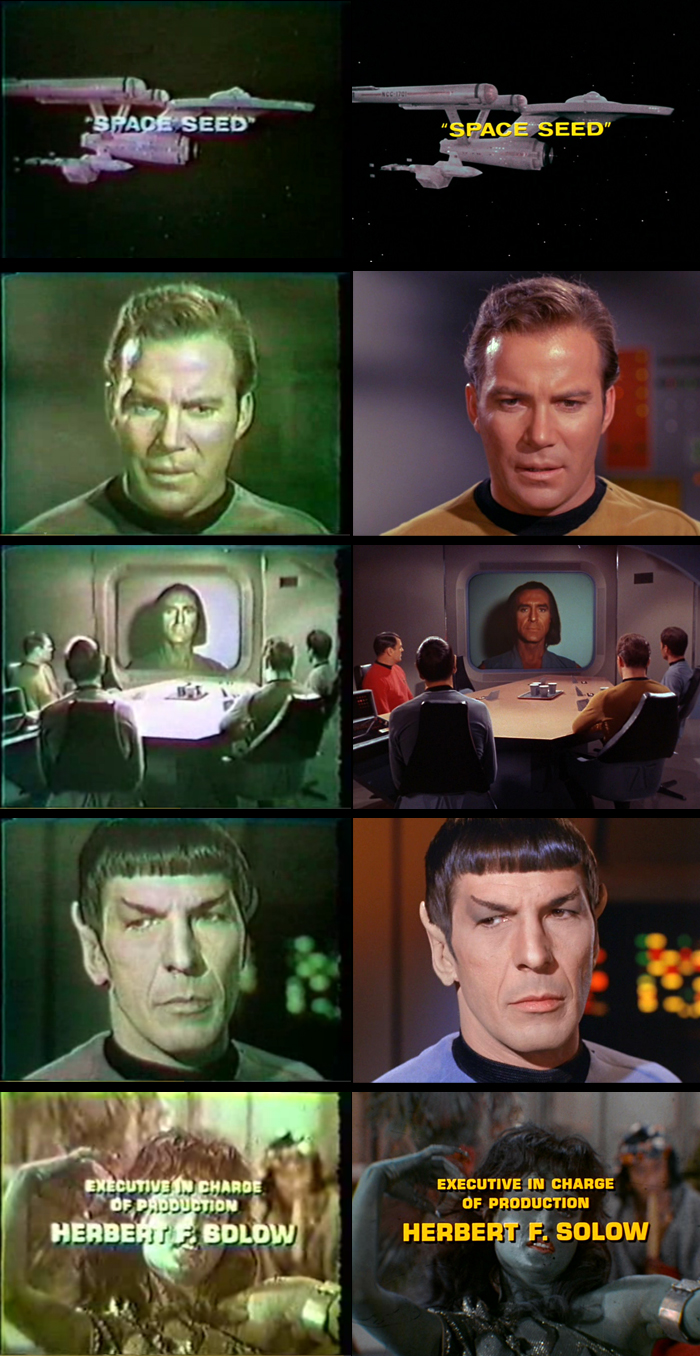This came up in a thread recently... but it isn't the first time that I've seen this put forward in relation to TOS. A lot of people look at TOS today and see camp, which they associate with the bright vivid colors used in TOS production which we see while watching TOS on regular broadcast TV or DVD or Blue-ray of today. And it is assumed by most that this is how it looked to viewers of the show back when it was first aired some 43 years ago.
What people don't realize is that television technology has changed drastically over the years. And was changing drastically at the time that TOS was being aired for the first time. A majority of homes with TVs still had black & white sets, and those with color sets weren't really seeing full colors by the time their TVs got the picture back then.
There is a very good example of what color TV was like back then that can be seen here:But even watching that doesn't truly illustrate the difference, so here are some screen captures from that example compared against screen captures from a relatively recent DVD release.

People have either forgotten the medium that TOS was produced for... or have never experienced it themselves. Most of us who grew up watching TOS didn't see it as bright and vivid as the current versions are today the first dozen or so times we watched it. We saw it very much like what I linked to above well into the late 70s.
Trying to hold all aspects of a mid 20th century TV show against people's 21st century standards, specially when people aren't seeing it the way the makers thought it was going to be seen, seems unfair.
Of course the persons it is unfair to are those who don't know any better. Those of us who love it would love it even if everyone else hated it and made fun of us for liking it.
... Not that anything like that actually ever happen to any of us.
Edit:
This is the best description of camp (and why Star Trek isn't camp) I've seen (from here):
What people don't realize is that television technology has changed drastically over the years. And was changing drastically at the time that TOS was being aired for the first time. A majority of homes with TVs still had black & white sets, and those with color sets weren't really seeing full colors by the time their TVs got the picture back then.
There is a very good example of what color TV was like back then that can be seen here:But even watching that doesn't truly illustrate the difference, so here are some screen captures from that example compared against screen captures from a relatively recent DVD release.

People have either forgotten the medium that TOS was produced for... or have never experienced it themselves. Most of us who grew up watching TOS didn't see it as bright and vivid as the current versions are today the first dozen or so times we watched it. We saw it very much like what I linked to above well into the late 70s.
Trying to hold all aspects of a mid 20th century TV show against people's 21st century standards, specially when people aren't seeing it the way the makers thought it was going to be seen, seems unfair.
Of course the persons it is unfair to are those who don't know any better. Those of us who love it would love it even if everyone else hated it and made fun of us for liking it.

... Not that anything like that actually ever happen to any of us.

Edit:
This is the best description of camp (and why Star Trek isn't camp) I've seen (from here):
Christopher said:The problem, though, is one of context. Star Trek did not exist in a cultural vacuum. It was a contemporary of shows such as Lost in Space and Batman. Those shows are extreme camp in the intentional sense. At the same time, the other Irwin Allen shows were campy in the unintentional sense. By the standards of the time, ST was just the opposite of camp -- it was the first non-anthology SF show that approached SF in a serious, adult manner, that aspired to realism rather than larger-than-life fantasy. Yes, it had the occasional episode that fell short of that aspiration and had campy elements -- especially in the third season -- but it would be unfair to characterize the whole series as camp when overall it was the first step in the maturation of television SF beyond camp.
Camp is intrinsically unrealistic, something that makes the audience laugh at its absurdity. A key part of the reason Star Trek gained such a devoted following is because it succeeded in creating a future that felt real (even with its fanciful elements), that audiences could invest in emotionally and intellectually and really care about. Camp can't do that.
Last edited:



 The worst that happened to us was losing the channel knob and having to use pliers.
The worst that happened to us was losing the channel knob and having to use pliers.